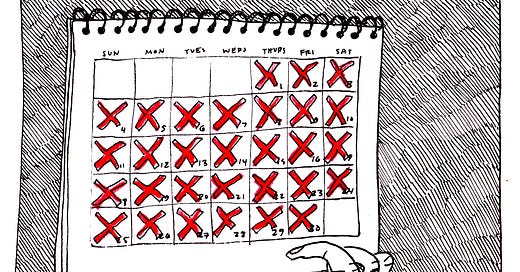Years Go By Fast
Where were you the day your life completely changed? George Bilgere. New tunes.
One of the items I retrieved after the big clean out of my father's office soon after he died was this black and white photograph of him at a Ford Motor Company sales conference sometime in the early 80s. There are four rows of men (and one woman!); the first two rows are seated, and the last two are standing. My father is standing in the third row, smiling, his hairpiece and Boyd's suit in peak form. Every person looks to be between 40 and 60 years old, all solidly American middle-management material. Seated in the front row, in the middle, smiling more prominent than anyone else, is NFL coach Dick Vermeil, who was a couple of years removed from taking the Eagles to the 1980 Super Bowl.
Vermeil was hired as the keynote speaker at this conference. I'm sure his primary duty that day was to fire up a roomful of sparkplug salesmen to treat every day like it's Super Bowl Sunday or something corny and insane. Vermeil was known for his work ethic—getting up at 3 a.m. daily to work 15 hours to coach a professional football team. He was a success, but he was also on the verge of a nervous breakdown and quit the Eagles at 46 at the request of his family.
But what trips me out about the photo is that Dick Vermeil autographed the picture, and here is what it said:
Big Al:
Years go by fast.
Coach Vermeil.
Dick Vermeil was younger than I am now when he sat for this photo. Dick Vermeil is also a few years older than my father in this photo, so my dad is probably all of 43. The message being sent that day wasn't about winning—it was about not working so damn hard all the time. Years go by fast—what will you do with them, Big Al?
I always wonder if my father thought he used those years wisely, the 35 or so that he lived after the photo, the ones Dick Vermeil warned him about. What would he change?
Most of you know this already: up until age 43, I had zero children—then, at age 45, I somehow had three. I was 11 months sober when the first one was born, then three years, seven months, and 1 day sober by the time the third one appeared. My years went by fast but were mostly unspectacular and selfish until the kids came. And now what? I was finally content once I had kids–especially when they were chubby babies sleeping on my shoulder. I got it, man. But then time showed up: Quickly, ruthlessly, ravaging all that contentment. There was a moment when I had three in diapers, and now no one is in diapers. I think we just gave away all the extra diapers one day, but nobody really noticed. That's how it goes. And now, how do I collaborate with the passage of time from here on out?
Whatever these feelings are–this heightened awareness and wistfulness for every second—is where George Bilgere fills in the gaps for me. He was the guest on this week's TSB podcast. Here's the scratch of the intro:
Those of you who read The Small Bow newsletter all the way through are probably familiar with my "Poem on the Way Out" that appears at the bottom of every newsletter. It's pretty straightforward. I chose a poem that complements the newsletter's tone.
How did I get into that habit? I was not a poetry major in college. However, I was a listless and unspectacular English and Communications major. But cut to 2017 when I'm working my way through early sobriety, attempting to put together a consistent morning journal routine. I discovered a poem that I loved – Stephen Dunn's "The Inheritance." From there, I began to seek out more contemporary stuff, ones that I read for their pure enjoyment. Ones that offered me recognizable worlds and helped me access some of the disorienting feelings I was navigating in early sobriety.
During that discovery process, I stumbled upon the work of George Bilgere, whose writing about fathers and sons and the acceleration of the passage of time just anchored me. He expertly captures and articulates a term that I've recently learned: micro-griefs, the small losses in everyday existence that are transforming our lives.
So give this a listen. You can find more of Bilgere’s work here.
After the money line, you’ll find three of my favorite Bilgere poems, plus some of the TSB essays in which his work has appeared.
These Sunday posts are mostly paywalled. But I don't want to exclude anyone, so if the cost is prohibitive or you wish to send TSB to someone you love, contact me. We'll happily pass along a free annual subscription to those who need it most.
Come join?
Keep reading with a 7-day free trial
Subscribe to The Small Bow to keep reading this post and get 7 days of free access to the full post archives.





